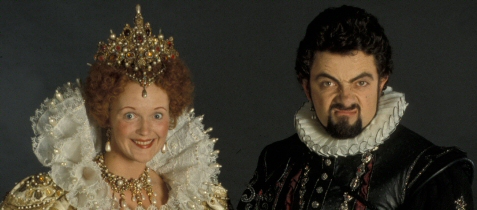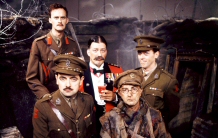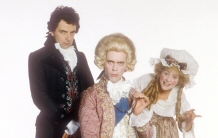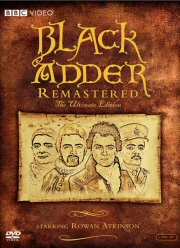The Ultimate Edition
- Comedy
- 2009
- Buy the DVD
Reviewed by Ross Ruediger
()
n The Hall of Great British Comedy, where all manner of witty, farcical and bawdy behavior is stored for safekeeping, there are a handful of TV shows which preside over all the rest. Fare such as “Fawlty Towers,” “Monty Python’s Flying Circus,” “Absolutely Fabulous,” “The Office” and “Mr. Bean” are all concepts that are so perfect in their conception and execution that they’ve found big audiences on both sides of the Atlantic. Alas, poor “Blackadder,” despite airings on both A&E and PBS, has never had much more than a cult following here in the U.S –
which is unfortunate, since it’s every bit the standout as the aforementioned programs and is more than deserving of being spoken of in the same breath. It details the exploits of one Edmund Blackadder (Rowan Atkinson) and his exploits throughout different eras of English history. Throughout his numerous incarnations, he’s accompanied by the reliably dimwitted Baldrick (Tony Robinson) and a handful of bumbling confidants and comical nemeses.
For a series with numerous strengths, perhaps its strongest is its wordplay: the way it deftly shifts from highbrow, almost lyrical comedic prose to simplistic, monosyllabic insult humor. If by some chance you feel it’s going over your head, stick around a few minutes and a penis or fart gag will invariably pop up. It’s tempting to throw out some quotes from the series, but frankly there are far too many to choose from, and I’m not even sure how they’d come across without the delivery of the fine cast which makes up the whole of “Blackadder.”
Ah, yes, the cast! Leading the troupe is, of course, Atkinson, and he’s probably never been finer than he is as Blackadder. For as big as “Mr. Bean” made him, this is an entirely different side of the man. You may have glimpsed flashes of his Adder brilliance in some of his other roles, but I’m pretty sure he’s never been given material that’s as suited to his talents as what writers Richard Curtis (“Love Actually”) and Ben Elton (“The Young Ones”) cooked up throughout the course of this series. This is largely a suave, calculated performance, and it’s impossible to imagine anyone other than Atkinson playing the part. He’s a true leading man, and far removed from the inept supporting player he so often seems to end up playing elsewhere. Tony Robinson’s Baldrick is, on the other hand, a simpleton – he represents the common man thrust into otherwise uncommon situations. Again, Robinson’s portrayal is so ideal that it becomes very easy to assume that he’s an imbecile in real life, although as various interviews on this set prove, he’s actually an incredibly well-spoken man (and, as I understand it, heavily involved in shaping the political landscape in his country). The rest of the main cast we’ll get to in due course, but before getting there, a roll call must be made of various actors that litter the “Blackadder” landscape in guest shots throughout the series: Jim Broadbent, Miriam Margolyes, Peter Cook, Rik Mayall, Tom Baker, Simon Jones, Ronald Lacey, Robbie Coltrane, Nigel Planer, Chris Barrie, Adrian Edmondson, Geoffrey Palmer, Colin Firth, and even Kate Moss! Those are only the most noticeable ones, and yet that’s still a pretty hefty cross-section of U.K. talent.
So we’ve got a slew of great actors delivering an even greater slew of pitch-perfect dialogue. Additionally, “Blackadder” boasts outstanding costumes. It’s the kind of stuff you’d see in any given BBC-produced period drama, only here it dresses up the comedy. Whether a character needs to appear a part of the regal aristocracy or a grungy manservant, the seemingly effortless capture of the period dress is a big part of what makes “Blackadder” so special.
The series first premiered in 1983, with its first season of six episodes, simply titled “The Black Adder.” Now, it must be explained that this first season – or series, as they’re called across the pond – shows a version of “Blackadder” that’s more of a work in progress. Most will say that it’s the weakest season of the show, but I don’t see it quite that way. What “The Black Adder” lacks is the wit and wordplay that would becomes the staple on the concept in the later seasons. Instead, it’s more of a situational romp, somewhat akin to “Monty Python and the Holy Grail,” although in all fairness, that’s doing a disservice to “Grail.” It’s a sort of alternate version of what went down following the death of Richard III (Peter Cook), who in this version is seen to be a rather kindly man. His successor, Richard IV (Brian Blessed), has two sons – the favored Harry (Robert East) and the sniveling Edmund (Atkinson). The ongoing saga tells of Edmund’s attempts to usurp his father’s throne and become king. Atkinson’s portrayal is also very different in this season, as is Robinson’s; here Baldrick is often seen to actually be smarter than his master. There’s still a lot to like about “The Black Adder,” but if this box set is your first exposure to the concept, it’s best to skip the first season, move on to the next and come back to the freshman year once you’re done watching everything else. Interestingly, this is the most expensive-looking season of the entire show, with lots of money spent on location shooting around real castles and the like. In any case, if these six episodes were the only “Blackadder” ever produced, it’s highly unlikely I’d be writing about it today.

“Blackadder II” emerged three years later, and the show had been given a massive overhaul. Unlike the first series, this season had almost no location shooting and instead was done largely in studio at the BBC. Edmund Blackadder (presumably descended from the character in the first series) is now living in Elizabethan times, and is in fact chums with the Queen herself (Miranda Richardson), although his royal lineage is never mentioned and presumably even forgotten. Instead, he’s a mere Lord and a gentleman about town – sophisticated, witty, and a hit with the ladies. He surrounds himself with two boobs, Baldrick and Lord Percy Percy (Tim McInnerny,) and spends most of his time attempting to curry favor with the Queen, who here is portrayed as an obnoxious, spoiled brat. Also joining the cast is Stephen Fry as Lord Melchet, Blackadder’s primary enemy in his attempts to win the Queen’s affections. Of the six episodes in this block, my personal favorite is “Beer,” in which Edmund tries to snag an inheritance from his Puritanical aunt and uncle by having them over for dinner, while also having a booze-up with his friends in the next room.
“Blackadder the Third” (1987) sees Edmund’s station falling even further. He’s now the butler and servant to George, the Prince of Wales (Hugh Laurie), a clownish buffoon. The work from Laurie here is so far removed from “House” you’ll be amazed it’s the same actor. Much of the season revolves around Edmund keeping the Prince out of trouble, whilst at the same time trying to swindle him out of his enormous fortune. This is a masterful season, and arguably the pinnacle of the series. The streamlined central cast of three leads to a set of efficient scripts which inspire countless moments of insanely perfect comedy. It features what many consider to be the greatest episode of all, “Ink and Incapability,” which tells the story of what happens when Baldrick accidentally burns the only copy of the world’s first dictionary, and Blackadder must rewrite it in one weekend – or suffer the wrath of the book’s writer, Dr. Johnson (Robbie Coltrane).
“Blackadder Goes Forth” (1989) sees a mild shift in the approach to the series after the previous two seasons. This time the action is moved to the trenches of WWI, and Blackadder is a mere Captain in the army, surrounded by shit and stupidity. Fry and McInnerny return as his chief rivals, while Laurie and Robsinson are his dimwitted friends. Richardson even returns as a love interest for Blackadder in one episode. Although still hugely funny, this season has a much darker edge to it, and deservedly so given the subject matter, which wasn’t nearly as “historical” as the previous series, and as such was given apt respect. The final episode, “Goodbyeee,” ends in a curiously dramatic fashion, and provides a chilling exit for the entire series, as this ended up being the final season of the show.
Aside from the four seasons, “Blackadder” also managed to cobble together several specials over the years, all of which are presented here on Disc Five. At the top of the heap is “Blackadder’s Christmas Carol,” which was made between “Third” and “Forth.” It shows yet another version of Blackadder: Ebeneezer, the “kindest man in England.” It’s no small triumph to put a spin on the famous Dickens tale, but this 45-minute offering is nothing short of brilliance, and it’s something I pull out and view every Christmas. “Blackadder: The Cavalier Years” is a short, 15-minute special that takes place during the English Civil War and features Stephen Fry as King Charles I, whom Blackadder is hiding from Oliver Cromwell. (You’d be surprised how much history, dubious though it may be, you can pick up from this series.) “Blackadder: Back and Forth” (1999) was the last new “Adder” ever made. It features a contemporary Blackadder and Baldrick who’ve built a time machine based on da Vinci’s notes. It’s an only slightly amusing one-off revival that did little more than prove the concept had probably run its course. There have been a few other short sketches and so forth unveiled over the years in various forms, but none of them are present here.
The set carries the subtitle “Remastered,” and as someone who owns the 2001 box set release, I’m afraid to report that whatever difference there is in picture quality over the previous release is negligible. It’s possible the colors are a tad sharper, but you’d have to have a very keen eye to see an improvement. Then again, I had no problem with the look of the old set; this is, after all, a (mostly) videotaped BBC show from the ‘80s, so I don’t expect it to look like a show from today. There’s also been a minor edit to “Christmas Carol” – a line from Baldrick about “nailing up the dog” has been excised, for reasons I’m unsure about. This was on the old set and given that I see this special every year, it’s a noticeable omission (of course if this is your first dance with the Adder, you’ll never know it’s missing). On the other hand, a poem that Baldrick recites about the Scarlet Pimpernel in “Nob and Nobility” – which was cut from the old release – has been reinstated! The other noticeable difference is that “Back and Forth” is now presented in 16x9 and with a laugh track. Unless you’re a special features hound, it’s impossible to recommend an upgrade, however it’s worth mentioning that this box is considerably cheaper than the previous set.
Regardless, and for whatever it’s worth, I would have given this set a full five stars if they hadn’t cut the “nailing up the dog” line; that’s how serious I am about my “Blackadder.”
Special Features: There are eight commentary tracks split amongst “II”, “Third,” and “Forth” (predictably, there are none for the first season). In various combinations they feature Ben Elton, Richard Curtis, Tony Robinson, Tim McInnerny, Stephen Fry, Rowan Atkinson and producer John Lloyd. There’s also “Baldrick’s Video Diary,” which is a 30-minute feature recorded mostly on the set of “Back and Forth.” The star attraction of the extras, however, is “Blackadder Rides Again,” a one-hour documentary made last year that’s a wonderful piece of work. If you’re a fan and need a reason to upgrade, this is as good an excuse as any. It covers all four seasons and features interviews with most of the principals involved in making the show (even Hugh Laurie, who’s interviewed by John Lloyd on the “House” soundstage). It’s a charming, intelligent doc that goes a long way to figuring out why this series is one of the best ever created under the Britcom banner. There are also extended interviews that are left over from “Rides Again” as well as a feature called “Costumes Revisited,” which again appears to be mostly made up of material that couldn’t fit into the doc’s running time. Finally, there are “Footnotes to History” which are dotted all over the set and are text bits that explain the various pieces of history which inspired many of the episodes.
 |
 |
You can follow us on Twitter and Facebook for content updates. Also, sign up for our email list for weekly updates and check us out on Google+ as well.













